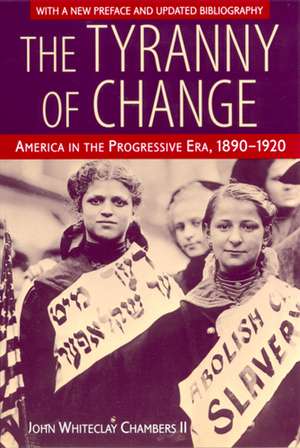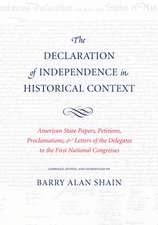The Tyranny of Change: America in the Progressive Era, 1890-1920
Autor John Whiteclay Chambers, IIen Limba Engleză Paperback – mar 2000
Between 1890 and 1920, the forces accompanying industrialization sent the familiar nineteenth-century world plummeting toward extinction. The traditional countryside with its villages and family farms was eclipsed by giant corporations and sprawling cities. America appeared headed into an unknown future.
In lively, accessible prose, John Chambers incorporates the latest scholarship about the social, cultural, political, and economic changes which produced modern America. He illuminates the experiences of blacks, Asians, Latinos, as well as other working men and women in the cities and countryside as they struggled to improve their lives in a transformed economy. He explores the dimensions of the new consumer society and the new information and entertainment industries: newspapers, magazines, the movies. Striding these pages are many of the prominent individuals who shaped the attitudes and institutions of modern America: J. P. Morgan and corporate reorganization; Jane Addams and the origin of modern social work; Mary Pickford and the new star-oriented motion picture industry; and the radical labor challenge of “Big Bill” Haywood and the “Wobblies.”
While recognizing a “progressive ethos”—a mixture of idealistic vision and pragmatic reforms—which dominated the mainstream reforms that characterized the period, Chambers elaborates the role of civic volunteerism as well as the state in achieving directed social change. He also emphasizes the importance of radical and conservative political forces in shaping the so-called “Progressive Era.”
The revised edition in this classic work has an updated bibliography and a new preface, both of which incorporate particularly the new social and cultural research of the past decade.
In lively, accessible prose, John Chambers incorporates the latest scholarship about the social, cultural, political, and economic changes which produced modern America. He illuminates the experiences of blacks, Asians, Latinos, as well as other working men and women in the cities and countryside as they struggled to improve their lives in a transformed economy. He explores the dimensions of the new consumer society and the new information and entertainment industries: newspapers, magazines, the movies. Striding these pages are many of the prominent individuals who shaped the attitudes and institutions of modern America: J. P. Morgan and corporate reorganization; Jane Addams and the origin of modern social work; Mary Pickford and the new star-oriented motion picture industry; and the radical labor challenge of “Big Bill” Haywood and the “Wobblies.”
While recognizing a “progressive ethos”—a mixture of idealistic vision and pragmatic reforms—which dominated the mainstream reforms that characterized the period, Chambers elaborates the role of civic volunteerism as well as the state in achieving directed social change. He also emphasizes the importance of radical and conservative political forces in shaping the so-called “Progressive Era.”
The revised edition in this classic work has an updated bibliography and a new preface, both of which incorporate particularly the new social and cultural research of the past decade.
Preț: 319.71 lei
Nou
Puncte Express: 480
Preț estimativ în valută:
61.18€ • 63.49$ • 51.14£
61.18€ • 63.49$ • 51.14£
Carte tipărită la comandă
Livrare economică 15-29 martie
Preluare comenzi: 021 569.72.76
Specificații
ISBN-13: 9780813527994
ISBN-10: 0813527996
Pagini: 350
Dimensiuni: 152 x 229 x 23 mm
Greutate: 0.48 kg
Ediția:None
Editura: Rutgers University Press
Colecția Rutgers University Press
ISBN-10: 0813527996
Pagini: 350
Dimensiuni: 152 x 229 x 23 mm
Greutate: 0.48 kg
Ediția:None
Editura: Rutgers University Press
Colecția Rutgers University Press
Notă biografică
John Whiteclay Chambers II is professor of history at Rutgers University. He recently co-edited The New Conscientious Objection and is the author of To Raise an Army: The Draft Comes to Modern America
Cuprins
Preface to the 2000 Edition
Preface to the Second Edition
Crisis of the 1890s
A New Kind of Growth
The Age of Industrialism
Prelude to the Twentieth Century
New Jobs, New Roles
The Weakened Spring of Government
Politics in the Depression Decade
The Taste of Empire
The Challenge of Change
The Corporate Revolution
The Great Merger Movement
The Mass Production, Mass Consumption Society
Changes in Work and the Work Force
Productivity and Pain in Agriculture
The New Corporate Economy
A Changing Society and Culture
A Growing Nation
Class and Status in American Society
Women, the Family, and Sexuality
Modernism and Institutions: Schools, Hospitals, Places of Worship
The Challenge of the City
A New Mass Consumption Culture
Aviation and the Promise of Technology
Modernism in Thought and Art
The Progressive Impulse
The Great Light
Progressives as Interventionists
The Progressive Agenda
The Development of Nationwide Reform
Voluntarism as a Middle Way
Reform in the Cities
Progressivism in the States
The Progressive Impulse
The Washington Whirligig
The Death of a President
Theodore Roosevelt: The Warrior as President
The Square Deal, 1901 -- 1909
Taft versus the Insurgents, 1909 -- 1913
Woodrow Wilson: The Scholar as Chief Executive
The New Freedom, 1913 -- 1916
Political Modernization
Taking the Flag Overseas
The Road to Interventionism
Roosevelt's Big-Stick Diplomacy
Taft's Dollar Diplomacy
Wilson's Missionary Diplomacy
World War I: U.S. Neutrality, 1914 -- 1916
The Road to Belligerency, 1916 -- 1917
The Debate over American Entry
World War I and the Search for a New World Order, 1917 -- 1920
America Goes to War
Mobilizing the Home Front
Workers and War: Organized Labor, Women, and Minorities
Victory in France, Defeat in the Soviet Union
The Diplomacy of Peacemaking and the Rejection of the League
Domestic Discord and Repression
The Meaning of the Progressive Era
The Interventionist Impulse
``Modernization'' in World Perspective
Cycles of Reform
The Legacy of the Progressive Era
The Progressive Era and the Nature of Modern America
Bibliography
Index
Preface to the Second Edition
Crisis of the 1890s
A New Kind of Growth
The Age of Industrialism
Prelude to the Twentieth Century
New Jobs, New Roles
The Weakened Spring of Government
Politics in the Depression Decade
The Taste of Empire
The Challenge of Change
The Corporate Revolution
The Great Merger Movement
The Mass Production, Mass Consumption Society
Changes in Work and the Work Force
Productivity and Pain in Agriculture
The New Corporate Economy
A Changing Society and Culture
A Growing Nation
Class and Status in American Society
Women, the Family, and Sexuality
Modernism and Institutions: Schools, Hospitals, Places of Worship
The Challenge of the City
A New Mass Consumption Culture
Aviation and the Promise of Technology
Modernism in Thought and Art
The Progressive Impulse
The Great Light
Progressives as Interventionists
The Progressive Agenda
The Development of Nationwide Reform
Voluntarism as a Middle Way
Reform in the Cities
Progressivism in the States
The Progressive Impulse
The Washington Whirligig
The Death of a President
Theodore Roosevelt: The Warrior as President
The Square Deal, 1901 -- 1909
Taft versus the Insurgents, 1909 -- 1913
Woodrow Wilson: The Scholar as Chief Executive
The New Freedom, 1913 -- 1916
Political Modernization
Taking the Flag Overseas
The Road to Interventionism
Roosevelt's Big-Stick Diplomacy
Taft's Dollar Diplomacy
Wilson's Missionary Diplomacy
World War I: U.S. Neutrality, 1914 -- 1916
The Road to Belligerency, 1916 -- 1917
The Debate over American Entry
World War I and the Search for a New World Order, 1917 -- 1920
America Goes to War
Mobilizing the Home Front
Workers and War: Organized Labor, Women, and Minorities
Victory in France, Defeat in the Soviet Union
The Diplomacy of Peacemaking and the Rejection of the League
Domestic Discord and Repression
The Meaning of the Progressive Era
The Interventionist Impulse
``Modernization'' in World Perspective
Cycles of Reform
The Legacy of the Progressive Era
The Progressive Era and the Nature of Modern America
Bibliography
Index
Descriere
In lively, accessible prose, John Chambers incorporates the latest scholarship about the social, cultural, political, and economic changes which produced modern America. He illuminates the experiences of blacks, Asians, Latinos, as well as other working men and women in the cities and countryside as they struggled to improve their lives in a transformed economy. He explores the dimensions of the new consumer society and the new information and entertainment industries: newspapers, magazines, the movies.




